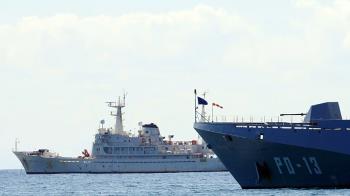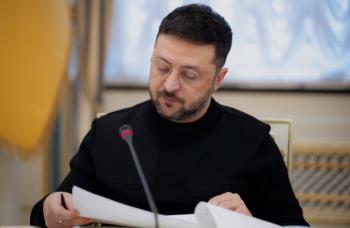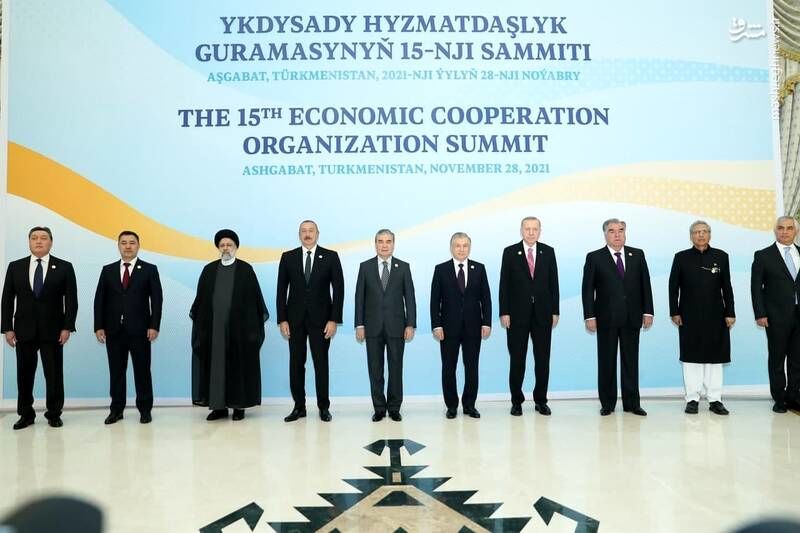Alwaght- Iran's President Ebrahim Raeisi has assured the Islamic Republic’s neighbors that US sanctions will have no bearing on regional cooperation and interaction.
Raeisi, who is in Turkmenistan’s capital Ashghabat to attend a summit of the Economic Cooperation Organization, called on member states to work together in a range of fields, from the creation of a regional electricity market, to water transfer projects as well as energy ventures, Press TV reported.
He said Iran is ready to help connect the fiber optic networks of member states as well as promote artificial intelligence projects and virtual education programs.
President Raeisi also proposed that the organization create an internal financial mechanism to boost its efficacy.
He said closer cooperation among the member states will help boost the efficiency of the Asian politico-economic organization.
“In addition to enjoying material features of power such as a population of half a billion, the ownership of one third of the world’s energy resources, a unique position…, and young and powerful human resources, the ECO has a privileged identity called Islam,” he said.
Over the years, he added, good progress has been made in ECO, but there is still a significant gap between the achievements and the real capacities and capabilities of the organization.
He stressed that Iran, as an influential country, seeks to improve the level of cooperation within the ECO and raise the status of the organization in international interactions.
“The Islamic Republic gives special priority to economic cooperation and partnership with Asian countries, especially its neighbors in West Asia, Central Asia and the Caucasus,” he added.
“Many economic openings in ECO depend on the promotion of intra-regional trade. Iran is ready to play a greater role in trade liberalization in ECO and contribute to achieving this important goal by granting appropriate preferential tariffs,” the president said.
ECO comprises all five Central Asian countries (Turkmenistan, Kazakhstan, Tajikistan, Kyrgyzstan, and Uzbekistan), as well as Afghanistan, Azerbaijan, Iran, Pakistan, and Turkey.
Natural gas deal with Turkmenistan
Earlier on Sunday, Raeisi met with Iranian businessmen and private sector activists in Ashgabat.
Referring to talks with his Turkmen counterpart on the development of bilateral relations in various sectors, including gas and transit, he said, “Today, with follow-up efforts, Turkmenistan is confident that the government of the Islamic Republic has a serious will to address the existing problems and obstacles.”
“The gas agreement between Iran and Turkmenistan will definitely be revived,” he pledged.
Raeisi emphasized that there is no serious problem in the path of boosting ties with the neighboring and regional countries, underlining the need for bilateral interaction and mutual understanding.
Boosting ties with Pakistan
Also on Sunday, the Iranian president met with his Pakistani counterpart, Arif Alvi, on the sidelines of the ECO summit.
Raeisi said the Islamic Republic was determined to develop and deepen all-out relations with Pakistan and has “no restrictions” in this regard.
In addition to being neighbors, the two countries enjoy a deep historical and cultural relationship, he noted. “Due to the vast capacities available, we consider the relations between the two countries insufficient and are resolved to activate all the capacities in line with the interests of the two nations and the nations of the region.”
Pointing to the crisis in Afghanistan, Raeisi stressed the need to support the oppressed nations, especially the Afghans, who are grappling with oppression, killing, looting and insecurity in the aftermath of twenty years of foreign occupation.
Iran backs the formation of an inclusive government in Afghanistan that represents all Afghan people, ethnic groups and political factions, the Iranian president said.
“Daesh is made by the Americans, who are using it (the terrorist group) to create insecurity in Afghanistan and the region, so we must stand against it,” he said.
Alvi, for his part, said Pakistan considered Iran as an important Muslim neighbor and brother based on the deep-rooted historical, linguistic, religious and cultural commonalities between the two countries.
He expressed satisfaction at the recent operationalization of International Road Transport (TIR) shipments from Pakistan to Turkey and Azerbaijan, which would be beneficial for the entire ECO region.
The two leaders expressed satisfaction on the regular high-level interactions, which had reinforced different avenues of bilateral cooperation and agreed to stay engaged on all issues of mutual interest.
On regional situation, particularly in the context of Afghanistan, Alvi noted the increased convergence of views among the neighboring countries.
He emphasized the need for a closely coordinated approach to achieving the shared objectives of a peaceful, stable and prosperous Afghanistan, emphasizing the need for the urgent provision of humanitarian and economic assistance to alleviate the sufferings of people of Afghanistan.



























